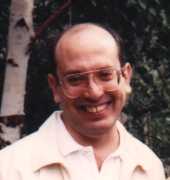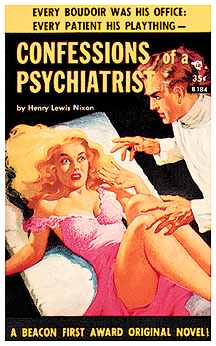|
| The Ninth Street Center |
Peer Counseling

Although the discussion groups are our most popular activity, counseling has always been the most important service the Center offers. Our fees are minimal and always donated to the Center. We call it "peer" counseling not because all opinions are created equal but rather to emphasize that the value of an idea is independent of who's expressing it and that we're not going to pull rank on you.
Recently, for a new brochure we're preparing, a few of our counselors typed up brief statements about how they approach counseling.
wrote:
After my therapist made me break down and cry for the second time — and again hailed that as a breakthrough — I decided I would be better off without her, as I had an idea of how scarily predictable the third session would be. I voted with my feet.
Reading Paul Rosenfels' works helped me understand — what had happened, who I am, where I am going. It gave me an idea of the unexplored potential humans have, and where to look for something better than what I had seen so far. In one or two hundred years from now, Rosenfelsian psychology will be common knowledge.
I've since learnt that trying to reach out and make friends is the best way to live — or to get my revenge — and to heal: Myself, and others. Peer counselling is what will happen naturally, whenever people decide to let others benefit from their experience, and are open to learn from their friends.
But the one piece of advice that made me acutely aware of what I was doing was this: "As you go through life, try to see our submissive and dominant traits in very positive ways, as I do all the resources that have evolved out of psychological polarity." (Dean Hannotte). Even after reading all of Paul's books, I needed to be hit over the head with this simple direction.
As for you, I want to see you rise above being merely "a survivor". I welcome your struggle with gender issues, absurd social demands, and political directionlessness. Struggling is not a defect, it is an asset. I will make an effort to see a greater picture than you can see at the moment, and once you wish you could see in yourself what I see in you — that will make my day.
wrote:

To me, peer counseling is a focused process of teaching and learning from others about what it means to be alive. It conveys the rewards that come from a better understanding of human nature to both teacher and student. As a child, I found discussions about the inner lives of characters from history and fiction to be fascinating. As an adult, I am more interested in learning up front about the motives of my fellow human beings. My own experience has been that peer counseling is worthwhile if the student is willing to: explore aspects of his/her homosexuality; grow psychologically; make changes for a better life, and make ongoing commitments of honesty and time in the sharing of information, experience and feelings.
The work that I do in peer counseling is strongly influenced by the writings of Paul Rosenfels and several of his students. While there will be no "pop quizzes," papers due or exams, anyone counseled by me should expect to do some reading of Paul's ideas. This will be done at the student's own pace. I make a point of this, because his texts have made the study of psychology so real for me.

John Calhoun is actually taking a break from seeing people, but he wanted to go on record too:
I'm a social worker who has been a Center member since 1985 and who appreciates many of Paul Rosenfels' ideas as most useful in helping others formulate and make sense of their problems. I see psychology at its best as an instrument for personal and societal development.
And wrote:
As a child I wondered a lot. Why does the world exist? Why don't people care about each other more? Why do children end up with the same religion and politics as their parents? Why don't people see how wonderful the world could be if we all worked together? Why do adults strut around in fancy clothes and yet hide their ignorance about, and deny their clumsiness in, everyday human affairs? Why aren't there scores of teachers and leaders in every community to help us develop the most precious asset we have, our human potential?
Around the age of ten I decided to become someone who could help people become better human beings. In high school I learned about "shrinks" but quickly ruled out that career path because they all seemed such transparent frauds. In college I read about great thinkers like Carl Jung who saw students and tried to help them "grow" without forcing a lot of academic mumbo-jumbo and tranquilizers down their throats. Then I met a practicing psychotherapist, Paul Rosenfels, who believed in the same things I did but who had started out 37 years earlier. I learned more from him than I'd ever learned from my own bumbling efforts to help my friends. In 1970 I opened the East Village Counseling Service.
My approach to counseling is to be totally open and honest, and to talk about anything you want to talk about — including any and all details of my own life. You may not need much more from me except to be a springboard for your own ideas. Or you may want more direct guidance. I have lots of ideas about how and why people get into trouble with their lives, and we can try out any number of them over time.

I see life as a laboratory where an experiment that fails can teach you as much as an experiment that succeeds. Unlike mental health professionals who need your situation to conform to something they once read in a textbook, I want your life to unfold in a natural and inner-directed way. Many people I see are new and original demonstrations of what an exemplary life looks like. It's not my job to dumb them down and make them conform. But if possible I will open doors for them they didn't know were blocking their progress.
Psychology is still in its infancy, yet shrinks often think they "know it all" simply because they've read the current literature. I don't have that problem. I know that human nature is something we're just starting to understand. I'd be delighted if you were among the many people who are changing the world and setting a new standard for what "human nature" can accomplish. And if you're comfortable with it, you may find yourself counseling me, too.
But aside from my respect for the individual and my refusal to categorize you according to symptoms you display, I feel fully competent to address all the commonplace interpersonal issues that we all face. Bosses, landlords, friends and lovers all add to and detract from the quality of our lives, and deserve to be dealt with as serious subjects.
Whether your problem is not knowing what contribution you want to make to civilization, or not knowing if you can stand your roommate for one more day, I believe I can help you gain new insight into your past, and get better control over your future. I know from long experience that counseling can be a valuable and rewarding experience for us both.
[C:\dh\web\NSC\3.1\HTP\Counsel.htp (336 lines) 2008-05-18 00:32 Dean Hannotte] | ||||||||